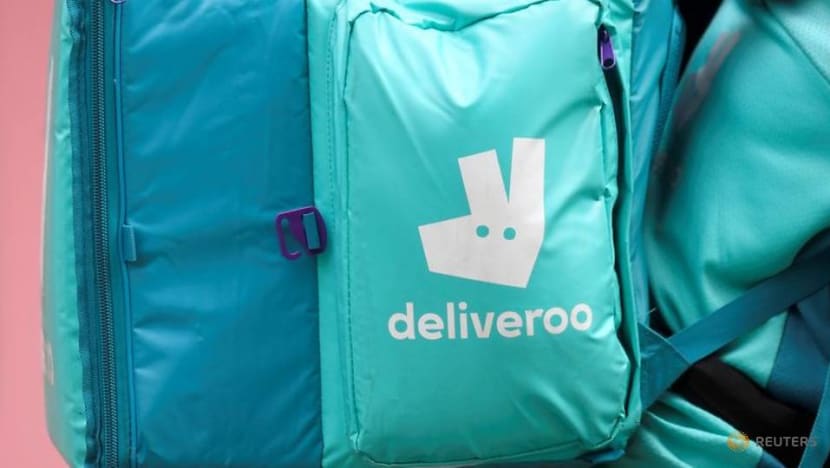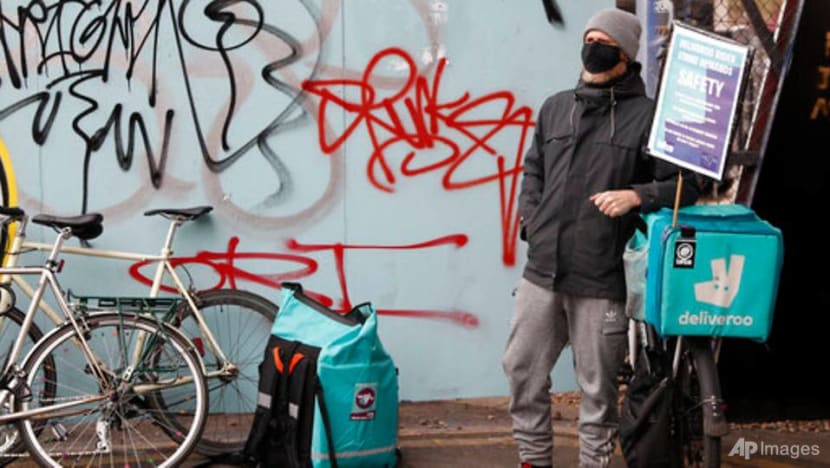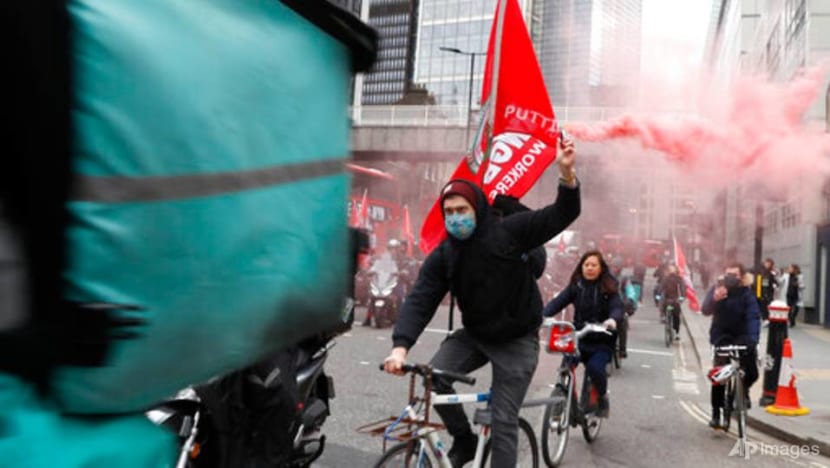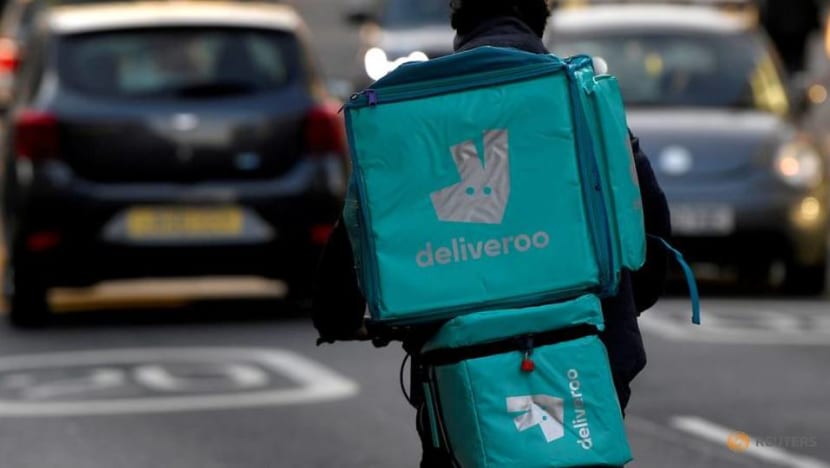commentary Commentary
Commentary: Deliveroo’s IPO is a lesson to not underestimate investors
The Deliveroo IPO debacle should not be seen as a barometer of future stock market listings for a few reasons, says The Smart Investor's David Kuo.

A Deliveroo delivery rider cycles in London, Britain, on Mar 31, 2021. (Photo: REUTERS/Toby Melville)
SINGAPORE: The initial public offering (IPO) of Deliveroo in early April this year was meant to be the start of something big for the UK.
Ahead of the stock-market listing, British finance minister, Rishi Sunak, hailed the highly anticipated listing as a true British tech success story that could clear the way for more IPOs from technology companies.
It turned out to be anything but a success story for many private investors. Some have said Deliveroo’s IPO was nothing short of an unmitigated disaster. They certainly have reasons to be disappointed.
After all, investment bankers Goldman Sachs and JP Morgan had priced the shares in the food-delivery app at £3.90 (US$5.36) a piece, which valued the company at £7.6 billion.
However, the market had a completely different take on the company’s valuation, even though tens of thousands of individual investors had reportedly bought shares ahead of its listing on the London Stock Exchange.
READ: Commentary: Deliveroo’s IPO - like changing tires while driving
REASONS TO INVEST
We don’t know why they invested in the shares. Some, especially Deliveroo’s customers, probably thought it was a great company and a good investment since they already believed in and subscribed to its service.
In fact, the company had earmarked £50 million (US$68.7 million) worth of shares for its own customers. To make it even easier for them, the company said each customer could apply for up to 1,000 pounds of shares through the company’s own app.
Other buyers might have thought they could “stag” the shares. This is where traders hope to make a quick profit by selling the shares in the market at a price higher than the IPO price. They could have been emboldened following the successful IPO of Airbnb last December, where shares in the property-sharing app more than doubled on its debut on Nasdaq.

But the outcome for Deliveroo investors could not have been more different. Shares in the company that counts Amazon as one of its investors slumped by a quarter on its first day of trading. It wiped off almost £2 billion from its expected market capitalisation.
Today, the shares are worth £2.59 each, which values the company at £4.6 billion. This is now some £3 billion less than what its advisors had reckoned the company should be worth.
A DOSE OF REALITY
Rishi Sunak remained stoical, though, when he was pressed by a journalist during a television interview after Deliveroo’s IPO. He was asked if he was embarrassed by the collapse of the shares. The UK finance minister said: “Gosh no … shares go up, shares go down. We should celebrate success in this country”.
The British Chancellor of the Exchequer is right. Share prices can go down as well as up as anyone with a remote understanding of the stock market will tell you. The stock market is the place for investors to collectively discover the true value of a business, especially where IPOs are concerned.
That is because in an IPO, the thrill of being allowed to buy shares for the first time in exciting new companies can sometimes get the better of common sense. So, it is important for investors to know a few things about what IPOs are.
(If none of what happened with GameStop made sense to you, listen to the author of this commentary break down how different players powered the surge and which listed company could see copycat attacks in CNA's Heart of the Matter podcast:)
EXIT STRATEGY
In an IPO, shares in a private company are offered to the public through the issue of new stock. It is supposed to help a new company raise fresh capital from investors.
Before an IPO, only a relatively small number of shareholders, who include founders and professional investors, have provided money for the company to get started. But through the IPO, many more investors can participate in the success of the company.
The IPO could also provide a way for the company’s early investors to sell some of their shares and earn a return on their investment. So, the IPO could be seen as a convenient exit route for the company’s early backers. Consequently, it is in their interest to sell their shares at the highest possible price.
READ: Commentary: Grab’s blockbuster deal comes at questionable time for SPAC market
READ: Commentary: What’s behind Grab’s reported SPAC listing
WHAT IS A FLOP?
Ironically, an IPO that has been described as “flop”, such as Deliveroo’s, should ultimately be seen as a success for the company. The IPO means that it has been able to sell new shares at inflated prices even if those shares didn’t meet initial valuations.
Conversely, a successful IPO where its shares soar at an initial listing could also mean the company or its advisors have badly undervalued the business. It could have sold the new shares at a much higher price and, in turn, raised more money for itself and its early backers.
By inference, therefore, a successful IPO is one where the share price does nothing on its first day. It means that the advisors have got the pricing of the shares just right - not too high or not too low.
BAD TIMING
In the case of Deliveroo, the market reckoned the shares were too expensive, which could be why they fell. But even though the shares collapsed on the first day, Deliveroo still managed to raise £1.5 billion, which it might not achieved if the shares had been priced lower.

In the aftermath of Deliveroo’s share-price collapse, there has been much hand-wringing over why the shares dropped.
Some have blamed the timing of the IPO, which coincided with many economies reopening after protracted lockdowns. Singapore, for instance, has allowed companies to bring back three-quarters of their staff to the office. The UK has allowed shops and restaurants to reopen.
With more economies returning to normalcy, there could be less demand for the services provided by food-delivery companies such as Deliveroo.
READ: Commentary: What if people don’t want to return to the office?
READ: Commentary: It’s mostly sociopaths who want to go back to the office
So, while turnover at Deliveroo has jumped nearly tenfold in the last five years, it is questionable whether the same pace of growth can be sustained. According to its chief executive Will Shu, Deliveroo’s business grew by more than 100 per cent in the UK and Ireland last year, as “the importance of online food delivery has grown hugely due to COVID-19”.
PROBLEMS GALORE
There are also issues about Deliveroo’s lack of profits. The company has made a loss every year since 2016 and was only profitable during the COVID-19 lockdown period.

Another bone of contention has been Mr Shu, who is also the company’s founder, retaining his 6.3 per cent stake in the company, but at the same time, having more than 50 per cent of voting rights.
This dual-class structure flies in the face of good corporate governance, where a single shareholder with a relatively small stake can have a disproportionately large say in the running of the company
Deliveroo’s dual-class structure also means that despite its hefty market valuation, it is ineligible for inclusion in any of the FTSE indices.
Had it been included in the FTSE 100 index, it would have meant that exchange-traded funds that track many of the UK stock market indices would have been forced to buy Deliveroo’s shares, regardless of whether they like the company.
READ: Commentary: Why a bumper crop of Southeast Asian tech unicorns look set to IPO this year
TO EXPENSIVE BY HALF
Likely, the biggest reason for Deliveroo’s share price collapse was its market valuation. In May 2019, Amazon paid US$575 million for a 16 per cent stake in Deliveroo, which valued the company at US$3.5 billion.
That was two years ago. Yet, 24 months later, the company is suddenly reckoned by investment bankers to be worth nearly three times more at £7.6 billion. And over that time, the company has racked up even more losses. It just didn’t make sense.
The Deliveroo IPO debacle should not be seen as a barometer of future stock market listings.
If anything, it is a timely reality check for the market. Investors have a healthy appetite for companies that have a compelling growth story to tell. There is also plenty of liquidity to finance growing companies. But it won’t overpay for them.
David Kuo is co-founder of The Smart Investor and previously the CEO of the Motley Fool Singapore.















